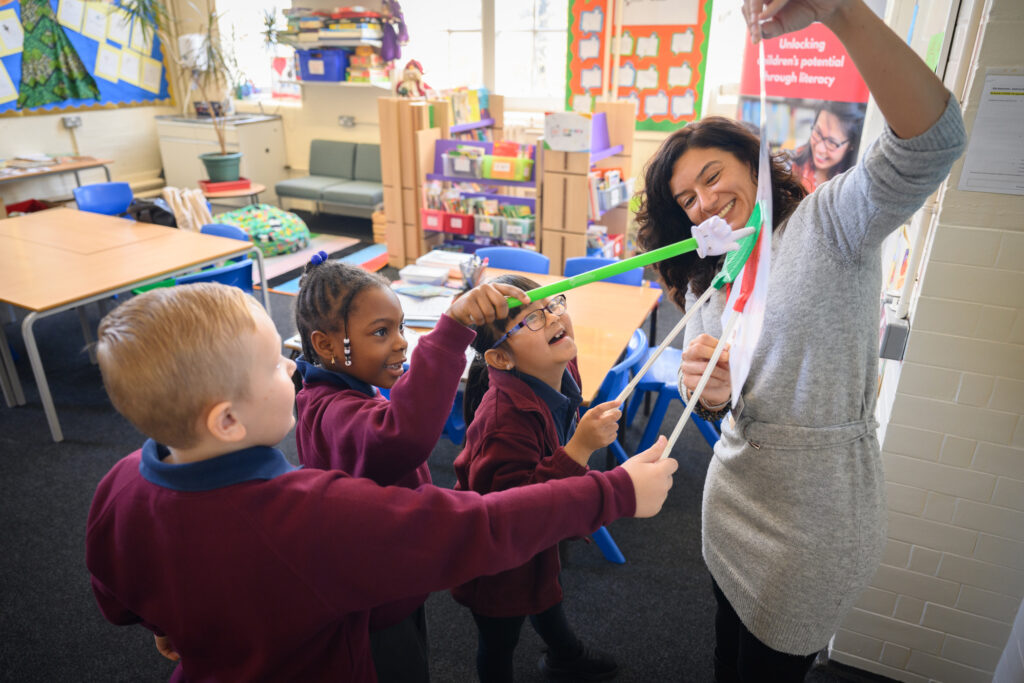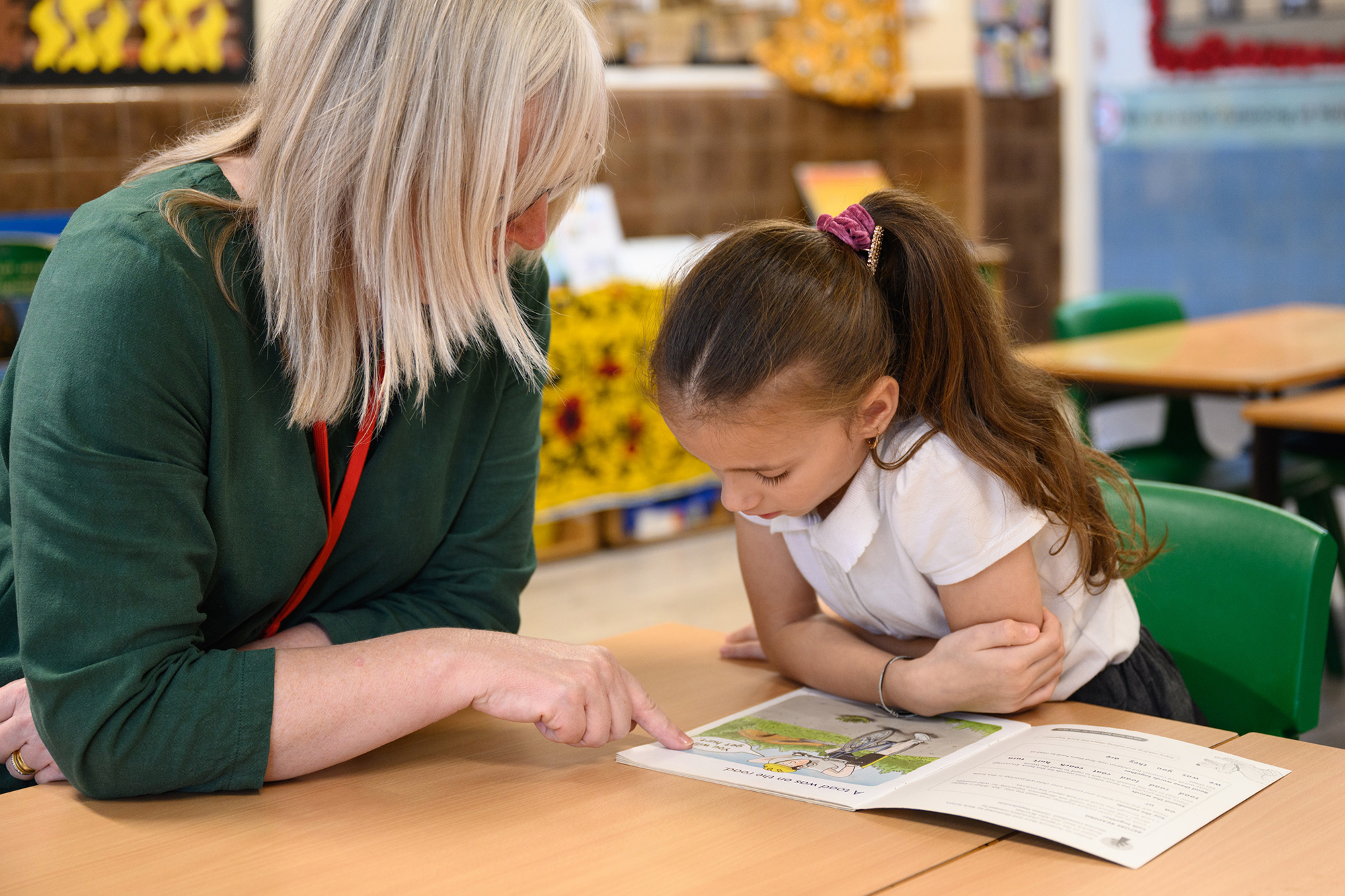In this blog, our Education Lead, Julie Taylor discusses why for disadvantaged children, phonics teaching alone is not always enough to produce confident and resilient readers.
Phonics is a subject that has attracted some considerable debate over the years and since the PIRL (Progress in International Reading Literacy) Study was published a few weeks ago, there has been much comment on the effectiveness of phonics in teaching children to read.
While it is, of course, excellent news that England is number four in the world for children’s reading, the fact that the country has maintained its high PIRL score in spite of the pandemic is also a testament to the dedication and quality of teachers and schools throughout this difficult time.
Phonics teaching alone is not always enough to produce confident, resilient readers.
As a specialist children’s literacy charity we have long supported the use of phonics but in our experience of working with disadvantaged children we know that phonics teaching alone is not always enough to produce confident, resilient readers who are able to engage effectively in the classroom and across the curriculum. We firmly believe that reading fluency, comprehension, oracy and reading for pleasure are equally important in giving disadvantaged children a vital step up.
Yet when you delve into the detail, the PIRL study showed that only 29 percent of pupils said they enjoyed reading, putting England 42nd out of 57 countries. It is this finding that should be a cause for concern.
In 2022 the attainment gap in education was at its widest level for a decade.
As long ago as 2002, The OCED (Organisation for Economic Co-operation and Development) said that “reading enjoyment is more important for children’s educational success than their family’s socio-economic status”. Clark and Rumbold (2006) argue that reading for pleasure could be one important way to help combat social exclusion and raise educational standards.
However, according to the Centre for Social Justice (CSJ) in 2022 the attainment gap in education – that between the poorest and most advantaged – was at its widest level for a decade.
The CSJ report, published in February this year, found that in 2022, 41% of year 6 pupils in England left primary school without meeting the expected standards in literacy and maths – 275,000 11-year-olds. That is 50,000 more than in 2019.
The picture for disadvantaged children is even starker: the majority (57 per cent) of children from disadvantaged backgrounds left primary school without reaching the expected literacy or maths standards – a significant increase on the pre-pandemic figure of 44 percent.
So what is to be done? The importance of specialist intervention.
Fostering a love of reading is essential for all children but particularly for disadvantaged children as this will help to embed reading for life and support children in accessing the wider curriculum – poor numeracy can often be a function of poor literacy.
Given the Government goal of improving literacy (and numeracy) to narrow the attainment gap and improve outcomes for the most disadvantaged in society, we believe specialist literacy tutoring to be a powerful solution for closing the literacy gap in primary school children.
All the evidence shows that early, tailored, one-to-one or small group intervention is highly effective, particularly at primary level and especially when supported by work to engage parents in their child’s acquisition of literacy skills.
Our skilled tutors foster a love of reading and use their adaptive teaching knowledge to meet the need of the child.
We have long argued that even in the best schools, with great teachers, some disadvantaged children struggle to make progress in the mainstream classroom. For these children, time with a specialist tutor such as those employed by us in our Literacy and Reading Labs can make a real difference.
Our skilled tutors foster a love of reading and use their adaptive teaching knowledge to meet the need of the child, recognising that for some children phonics can only achieve so much.
In our Labs children benefit from the consistent, nurturing support of a highly trained, employed tutor. Pupils ‘graduate’ having grown in confidence, self-esteem and resilience. Schools often comment that it is this feature of our work that adds the greatest value.
In one month of our Literacy Lab tuition, children make 4.9 months of progress.
In 2021/22 our Literacy Labs worked with disadvantaged children who were on average 15 months behind where they should be with their reading. We are, therefore, supporting the children who are the most behind and are at greatest risk of being left behind.
In one month of our Literacy Lab tuition – where we build on phonics to develop comprehension, writing, listening and speaking skills – children make 4.9 months of progress.
We also work closely with schools to engage parents in our work. The PIRL researchers found that parents and families make an important contribution to a child’s literacy journey – a view strongly supported by the CSJ report too.
Our fear though is that with ever increasing pressure on budgets, schools will be unable to access specialist literacy tuition work at a time when the catch-up needs of the most disadvantaged are still great.
The recent DfE announcement that the National Tutoring Programme subsidy will be 50% for the final year of operation is welcome news indeed but as the even more recent Education Recovery in School Report (June 23) highlights: “The growing attainment gap with all its implications for children’s life chances can’t be allowed to continue. It is alarming that it may take a decade for the gap in attainment between disadvantaged pupils and others to return to what it was before the COVID-19 pandemic.”
We therefore hope that schools are able to continue to access tuition funding and that it is channelled into those programmes which will have the most impact on the children who need the most help.
Help to close the literacy gap.
We are incredible grateful to all our current supporters who help to fund our vital literacy programmes in schools. If you would like to help close the literacy gap for more disadvantaged children, please get in touch: fundraising@theclc.org.uk
Read more about our expert literacy programmes.


